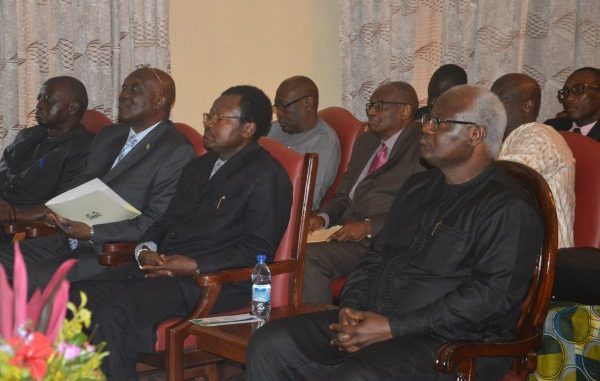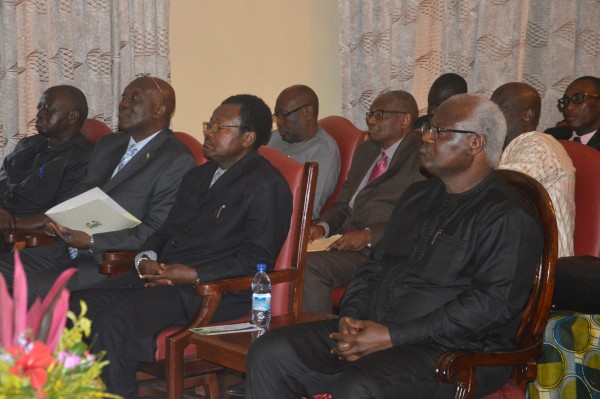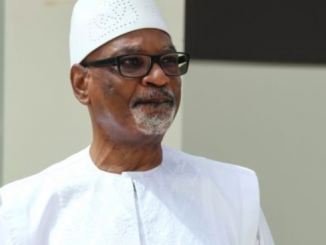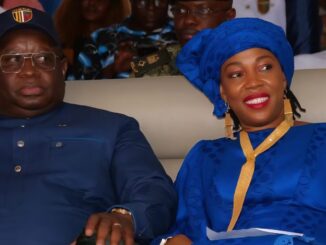
By State House Communication Unit
President Dr Ernest Bai Koroma this morning (October 5, 2016) unveiled a video documentary about the Sierra Leone Pay & Performance Project. The project, organized by the Public Service Reform Unit in the Office of the President, aims to focus on Pay Reform, Recruitment and Staffing and Performance Management and Accountability in the Civil Service.
Delivering the keynote address shortly before officially launching the video, President Koroma said the documentary is a first step to raising public awareness about the progress his government has made in reforming the public sector; a sector that was most ineffective, non-transparent, unaccountable and unattractive. “It was notorious for its appalling public service delivery over an excessively high wage bill and ghost workers marauding in practically every sector,” he lamented.
The president pointed out that the implementation of the Pay & Performance project will eliminate pay distortions, enhance competitiveness and to attract, motivate and retain skills across Ministries, Departments and Agencies (MDAs). The project, he emphasized, seeks to improve Payroll integrity, introduce robust Performance-based Management that links rewards to productivity and develops capacity through sustained training and institutional upgrading.
President Koroma also noted that most of the reforms undertaken in the past to redress what he described as the ‘anarchy’ that plagued the civil service were at best uncoordinated and lacked Government ownership and leadership ensuing in duplicity and wastage with little or no real impact on the productivity of the institutions under review.
“That was why in 2007, my Government transformed the Governance Reform Secretariat into the Public Sector Reform Unit (PSRU) with the mandate to identify reform needs and opportunities, and to provide leadership, co-ordination and strategic guidance on the design, implementation and monitoring of Public Sector Reform programmes,” the Chief Executive told a jammed packed hall of cabinet ministers and senior government officials.
Furthermore, the president informed that in 2008, he launched the Human Resources Management Office (HRMO) as a successor to the Establishment Secretary’s Office in order to move away from traditional bureaucratic principles to modern HR practices in the Civil Service. According to President Koroma, these efforts have paid off considerably especially when one looks at systems and processes upgrade from the Colonial General Orders to the Civil Service Code, Regulations and Rules; strategic alignment of mandates, functions and structures of MDAs through Management and Functional Reviews.
“A merit-based recruitment procedure has been implemented, leading to the recruitment (on a highly competitive basis) of over 1,400 critical skills mostly at the middle level. We have conducted payroll biometric verification exercises for the Civil Service and for Teachers; Performance Contracting Management has been rolled out to public service operatives and there has been a shift from the Annual Confidential Reporting to Individual Performance Appraisal System (IPAS) among many other reforms,” he said.
Chairman of the Public Service Commission (PSC), Dr Max Amadu Sesay, in his statement said the PSC metaphorically represents the main gateway into the Civil Service by virtue of the provisions of sub-section (1) of Section 152 of the 1991 Constitution of Sierra Leone. He furthered that because recruitment is a human resource management function that impacts most critically on the performance of an organization, the PSC is determined to ensure that the best brains and skills-mix should henceforth be recruited into the civil service.
The Task Team Leader, P&PP at the World Bank, Mr Roberto O. Panzardi said the Government of Sierra Leone and the World Bank entered into a partnership when they signed the Pay & Performance Management Project four years ago. He said the objective of the project is to improve competitiveness in pay, performance management and accountability of, and increase staffing of middle and senior staff in, the civil service in Sierra Leone.
The Secretary to the President who also doubles as Chairman of the ceremony, Mr E.B Osho Coker, explained that the production of the 18 minute documentary was funded by the World Bank who provided $17 million as funding for the project.
Director of PSRU, Sidratu Koroma, in her welcome statement said the civil service is the backbone of government, saying if the backbone has problems the entire system could slipup.
She noted the pressing need for the civil service to be capacitated, adding that the video documentary is therefore a move to mitigate risks posed by the backbone, she said.
Other speakers include the acting Minister of Finance and Economic Development, F.B.L. Mansaray, the Secretary to the Cabinet & Head of Civil Service deputised by Mr L.B.O. Massaquio, and Director General of the Human Resources Management Office, Mr A.R. Bayoh.




